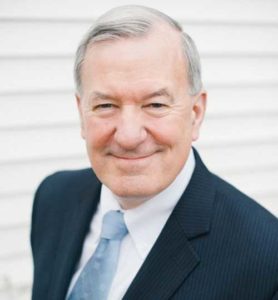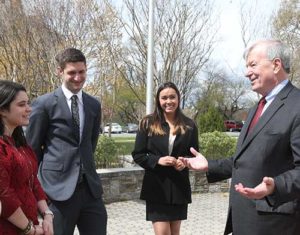ST. FRANCIS — Bill Bowman, 67, a Whitefish Bay native, was appointed dean of the Busch School of Business and Economics at The Catholic University of America in Washington, D.C., in August. It is the only business school in the United States chartered by the Vatican.
“He is, in essence, the Vatican’s point man on business education in the United States,” said Robert Warren, an accounting professor for the Busch School.

Bill Bowman (Submitted photo, Isabel Furie Photographs )
Bowman, who attended the former Henry Clay School, now Whitefish Bay Middle School, and graduated from Whitefish Bay High School in 1967, was a member of St. Monica Parish.
“Whitefish Bay is an idyllic place to grow up,” said Bowman in a Sept. 30 phone interview with the Catholic Herald. “It’s a lovely town and the schools are fantastic. It was challenging academically and the football team was fairly good in those days when I played. All those things provided me with a strong foundation for what came next.”
Bowman studied industrial engineering and management science at Northwestern University and upon graduation worked for the United States Public Health Service in Cincinnati. He also married his high school sweetheart, Leigh (née Daggett), with whom he has nine children.
“She was one of the cool kids in the class and I was one of the geeks, but we were both given an award together and that began a courtship that never ended,” he said.
While working for the Public Health Service, Bowman earned a master’s degree in business administration with distinction from the Harvard Business School. He worked for the Boston Consulting Group, a worldwide management-consulting firm in Boston, Massachusetts.
Bowman became involved with Catholic education in 1978 when he co-founded the Montrose School, an independent school for girls in grades six to 12, inspired by the teachings of the Catholic Church, in Medfield, Massachusetts, where he served as chairman of the school’s board of trustees for 10 years.
He also served for six years as the governor-appointed trustee for the University of Massachusetts’ five campuses.
In 1982 Bowman co-founded Spinnaker Software Corporation, one of the nation’s first educational software companies, which was later sold to The Learning Company. Continuing his entrepreneurial ventures he began operations for Logal Software, Inc., another educational software company where he was president and helped take the company public in 1996.

Bill Bowman, dean of the Busch School of Business and Economics at The Catholic University of America in Washington D.C., chats with students on campus. (Submitted photo by Justin Walker courtesy The Catholic University of America)
In 1998 he became president of ChildrenFirst Inc., now Bright Horizons, the nation’s leading provider of backup childcare services to corporations. Bowman was also president and CEO for US Inspect from 2003 to 2012, the nation’s largest home and commercial building inspection company.
Before his appointment as dean of the Busch School of Business and Economics, Bowman launched Core Values Group LLC, a Boston consulting firm that works with employees to help them grow in human virtues that are most important to their organization’s success.
“I’ve always approached my next job prayerfully; early in life, someone told me to give God a lot of options, go out and work hard and apply to this place that’s going to make a career change, but don’t worry about the outcome; just put it in God’s hands and abandon yourself to his will,” said Bowman. “I’ve been surprised with what’s come up and certainly this shift into academia at The Catholic University of America was nowhere on my radar.”
Originally, Bowman did not see a correlation between business and religion until a priest introduced him to Pope Leo XIII’s 1891 encyclical “Rerum Novarum” that addresses the condition of the working classes and the mutual duties between labor and capital.
“I saw how incredibly and beautifully the Catholic Social Doctrine informs the business world and applies to everyone,” said Bowman, who gave workshops on the subject throughout the country for 15 years.
“When Enron fell, that was kind of a wakeup call for a lot of Catholic business people; a lot of the people involved with Enron were Catholics and had graduated from Harvard Business School,” said Bowman. “The question that came up is what is going on with ethics that are so legible but aren’t particularly believed?”
While giving workshops on Catholic Social Teaching, Bowman met John Garvey, president of Catholic University of America, and Andrew Abela, provost of the university and the founding dean of the Busch School of Business and Economics.
“It was so clear that they were light years ahead of everybody else when thinking about Catholic Social Doctrine in business,” said Bowman, who became a member of the advisory board for the university’s Master’s in Business Analysis program.
As dean, Bowman organizes the curriculum around the four principles of Catholic Social Teaching: human dignity, common good, subsidiary and solidarity.
“We are the only Catholic university that implements the four basic principles of Catholic Social Doctrine, which is our central mission,” said Bowman. “Other schools offer courses on the topic, but we want to live it and bring it into every single class and help businesses and communities operate a lot better.”
To promote Catholic Social Teaching in the corporate sector, CUA hosts conferences on human ecology and has partnered with the Napa Institute in a joint venture conference to address critical issues facing Catholic leaders in America. The university is also involved in consulting with public organizations and looks to help create more jobs in the inner city of Washington, D.C.
“The pope is challenging us in business to really understand and refine the definition of what a good business is from a social standpoint,” said Bowman. “When you think about Catholic Social Doctrine, it really is natural law and not revealed truth.”
Bowman hopes that in 50 years all the major businesses in America will operate under the model of Catholic Social Teaching.
In the meantime, however, he and his wife look forward to returning to Whitefish Bay next summer for their 50th high school reunion.
